Analyzing Management Behaviour Role in Operational Improvement
VerifiedAdded on 2023/01/07
|33
|9023
|84
Report
AI Summary
This report, part of a Business and Management dissertation, investigates the critical role of management behaviour in achieving operational improvement, efficiency, and effectiveness within an organization. It explores various management styles and their impact on employee motivation and organizational performance, drawing on a literature review that covers the responsibilities of a manager, different management styles, and the importance of organizational behaviour. The research focuses on the Range Distribution Centre, examining how leadership and management approaches influence operational development, particularly in a large-scale warehouse environment. The methodology includes questionnaires and interviews to gather data and analyze the effectiveness of different management behaviours. The report analyzes findings, and discusses future research directions, and offers a conclusion summarizing the key insights and implications for management practices. It highlights the significance of effective communication, employee motivation, and the adoption of appropriate management styles to enhance operational outcomes.
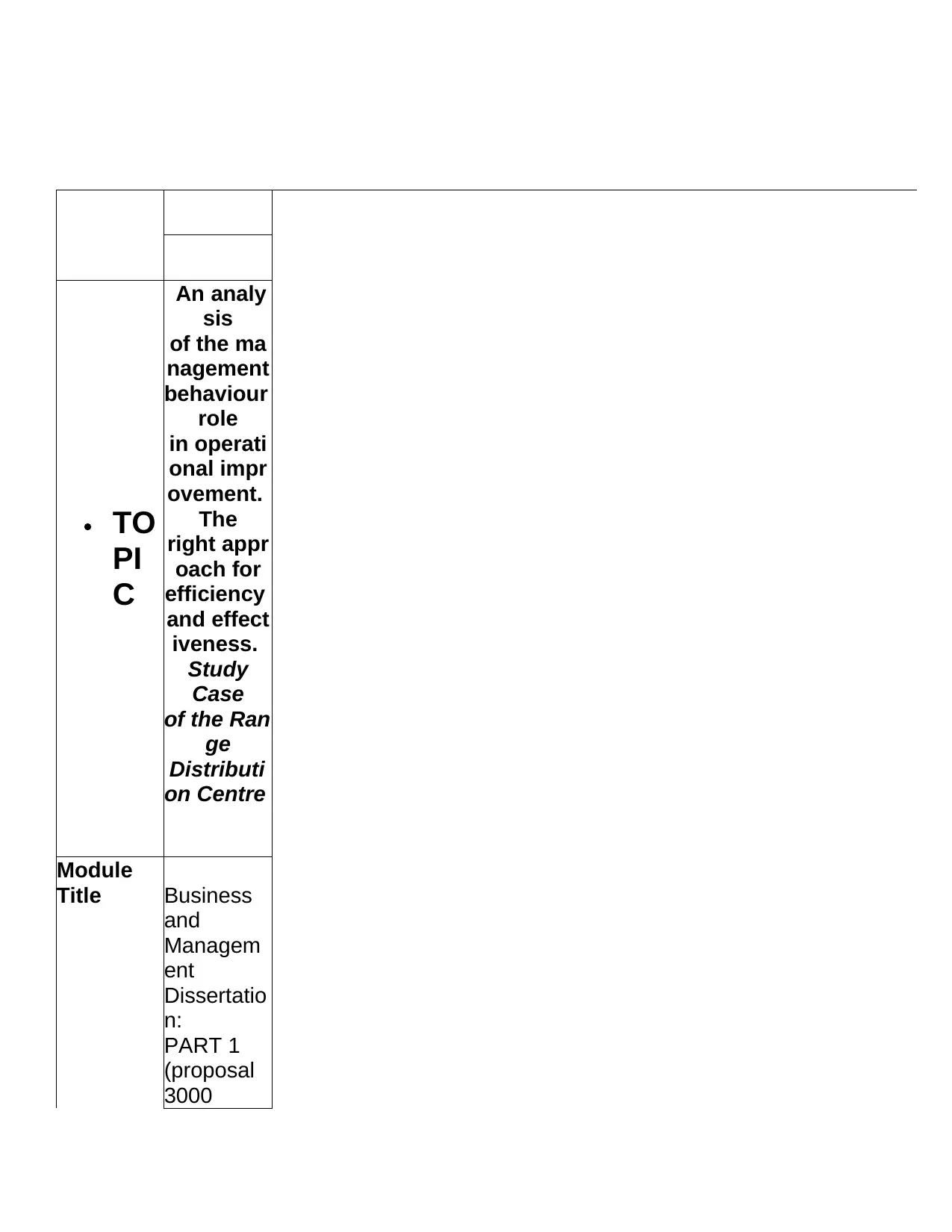
TO
PI
C
An analy
sis
of the ma
nagement
behaviour
role
in operati
onal impr
ovement.
The
right appr
oach for
efficiency
and effect
iveness.
Study
Case
of the Ran
ge
Distributi
on Centre
Module
Title Business
and
Managem
ent
Dissertatio
n:
PART 1
(proposal
3000
PI
C
An analy
sis
of the ma
nagement
behaviour
role
in operati
onal impr
ovement.
The
right appr
oach for
efficiency
and effect
iveness.
Study
Case
of the Ran
ge
Distributi
on Centre
Module
Title Business
and
Managem
ent
Dissertatio
n:
PART 1
(proposal
3000
Paraphrase This Document
Need a fresh take? Get an instant paraphrase of this document with our AI Paraphraser
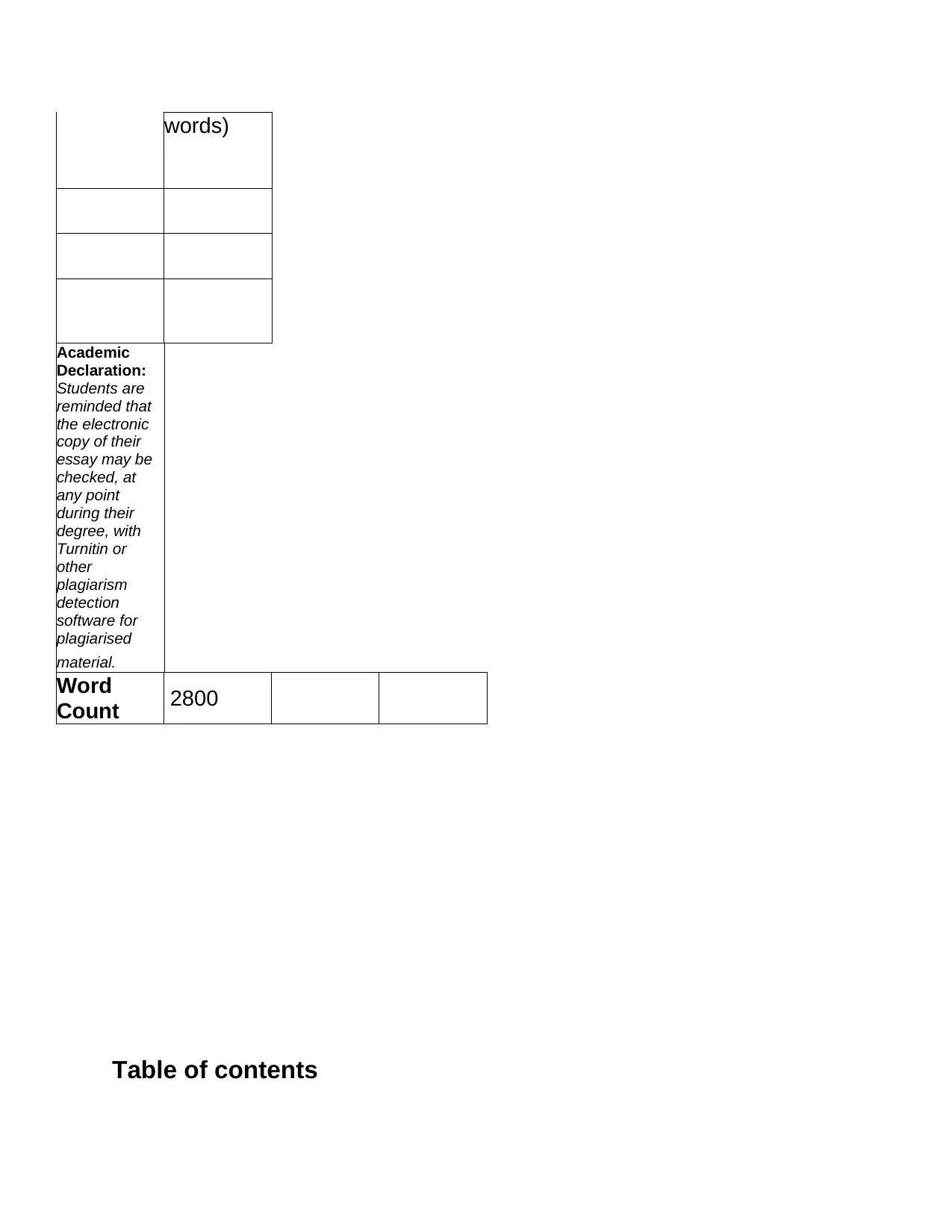
words)
Academic
Declaration:
Students are
reminded that
the electronic
copy of their
essay may be
checked, at
any point
during their
degree, with
Turnitin or
other
plagiarism
detection
software for
plagiarised
material.
Word
Count 2800
Table of contents
Academic
Declaration:
Students are
reminded that
the electronic
copy of their
essay may be
checked, at
any point
during their
degree, with
Turnitin or
other
plagiarism
detection
software for
plagiarised
material.
Word
Count 2800
Table of contents
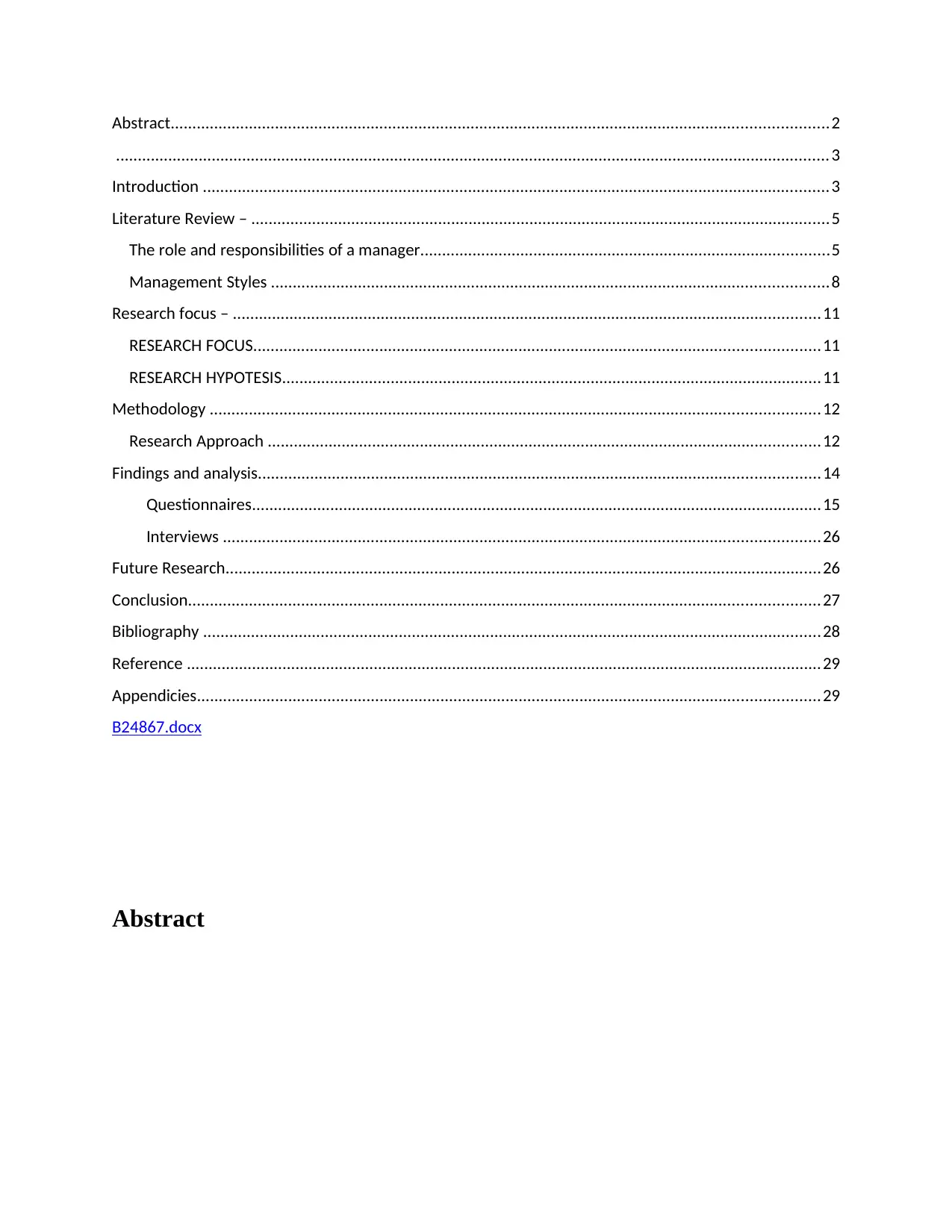
Abstract.......................................................................................................................................................2
....................................................................................................................................................................3
Introduction ................................................................................................................................................3
Literature Review – .....................................................................................................................................5
The role and responsibilities of a manager..............................................................................................5
Management Styles ................................................................................................................................8
Research focus – .......................................................................................................................................11
RESEARCH FOCUS..................................................................................................................................11
RESEARCH HYPOTESIS............................................................................................................................11
Methodology ............................................................................................................................................12
Research Approach ...............................................................................................................................12
Findings and analysis.................................................................................................................................14
Questionnaires...................................................................................................................................15
Interviews .........................................................................................................................................26
Future Research.........................................................................................................................................26
Conclusion.................................................................................................................................................27
Bibliography ..............................................................................................................................................28
Reference ..................................................................................................................................................29
Appendicies...............................................................................................................................................29
B24867.docx
Abstract
....................................................................................................................................................................3
Introduction ................................................................................................................................................3
Literature Review – .....................................................................................................................................5
The role and responsibilities of a manager..............................................................................................5
Management Styles ................................................................................................................................8
Research focus – .......................................................................................................................................11
RESEARCH FOCUS..................................................................................................................................11
RESEARCH HYPOTESIS............................................................................................................................11
Methodology ............................................................................................................................................12
Research Approach ...............................................................................................................................12
Findings and analysis.................................................................................................................................14
Questionnaires...................................................................................................................................15
Interviews .........................................................................................................................................26
Future Research.........................................................................................................................................26
Conclusion.................................................................................................................................................27
Bibliography ..............................................................................................................................................28
Reference ..................................................................................................................................................29
Appendicies...............................................................................................................................................29
B24867.docx
Abstract
⊘ This is a preview!⊘
Do you want full access?
Subscribe today to unlock all pages.

Trusted by 1+ million students worldwide
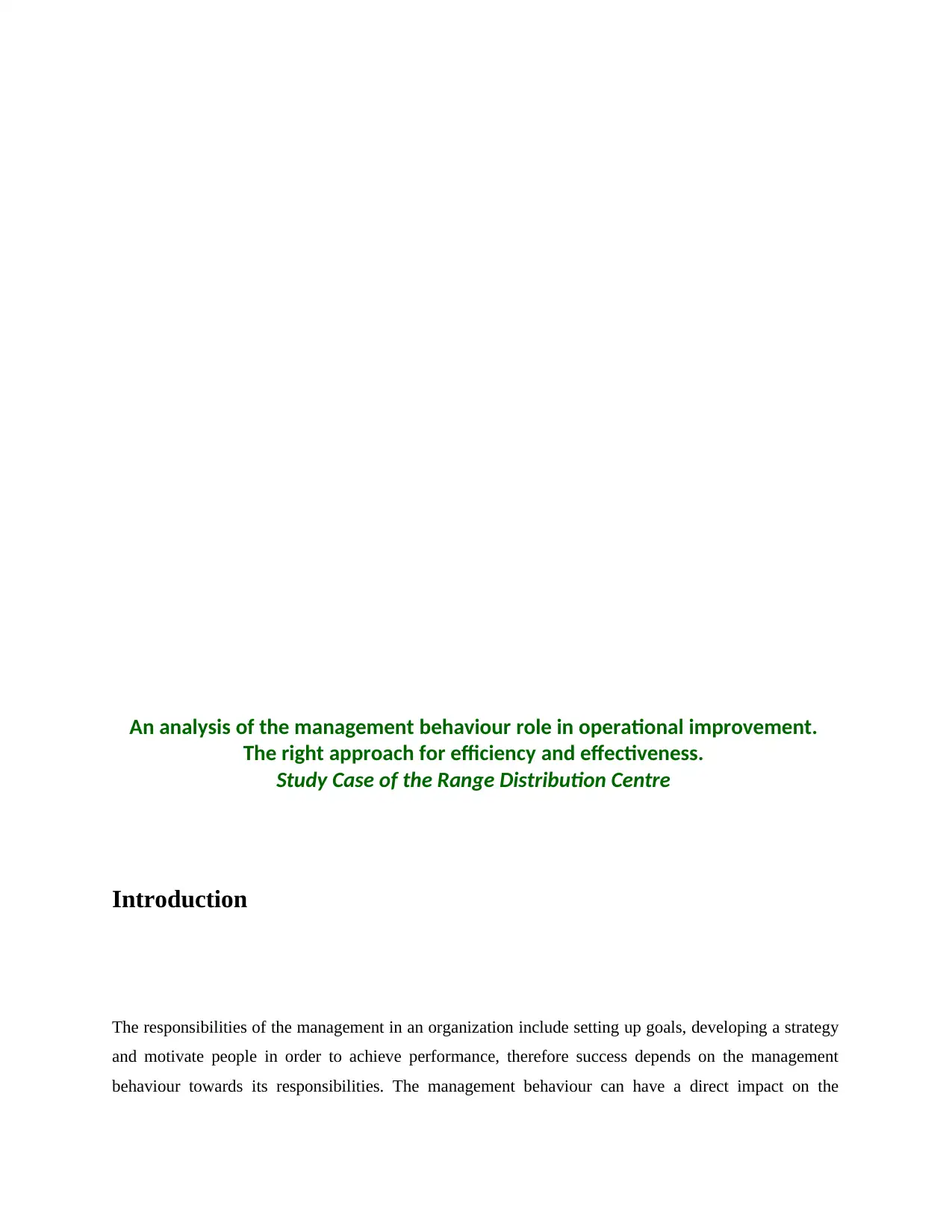
An analysis of the management behaviour role in operational improvement.
The right approach for efficiency and effectiveness.
Study Case of the Range Distribution Centre
Introduction
The responsibilities of the management in an organization include setting up goals, developing a strategy
and motivate people in order to achieve performance, therefore success depends on the management
behaviour towards its responsibilities. The management behaviour can have a direct impact on the
The right approach for efficiency and effectiveness.
Study Case of the Range Distribution Centre
Introduction
The responsibilities of the management in an organization include setting up goals, developing a strategy
and motivate people in order to achieve performance, therefore success depends on the management
behaviour towards its responsibilities. The management behaviour can have a direct impact on the
Paraphrase This Document
Need a fresh take? Get an instant paraphrase of this document with our AI Paraphraser
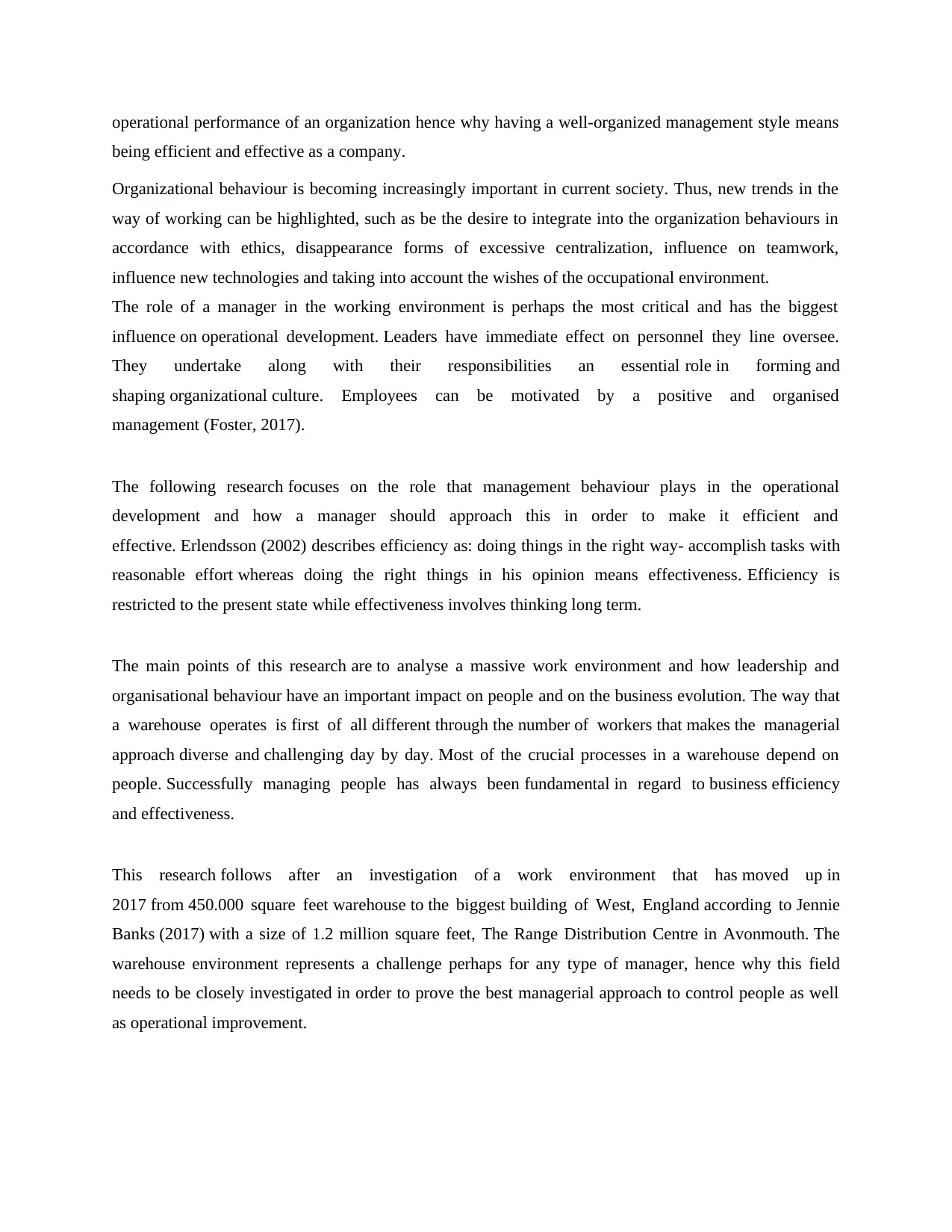
operational performance of an organization hence why having a well-organized management style means
being efficient and effective as a company.
Organizational behaviour is becoming increasingly important in current society. Thus, new trends in the
way of working can be highlighted, such as be the desire to integrate into the organization behaviours in
accordance with ethics, disappearance forms of excessive centralization, influence on teamwork,
influence new technologies and taking into account the wishes of the occupational environment.
The role of a manager in the working environment is perhaps the most critical and has the biggest
influence on operational development. Leaders have immediate effect on personnel they line oversee.
They undertake along with their responsibilities an essential role in forming and
shaping organizational culture. Employees can be motivated by a positive and organised
management (Foster, 2017).
The following research focuses on the role that management behaviour plays in the operational
development and how a manager should approach this in order to make it efficient and
effective. Erlendsson (2002) describes efficiency as: doing things in the right way- accomplish tasks with
reasonable effort whereas doing the right things in his opinion means effectiveness. Efficiency is
restricted to the present state while effectiveness involves thinking long term.
The main points of this research are to analyse a massive work environment and how leadership and
organisational behaviour have an important impact on people and on the business evolution. The way that
a warehouse operates is first of all different through the number of workers that makes the managerial
approach diverse and challenging day by day. Most of the crucial processes in a warehouse depend on
people. Successfully managing people has always been fundamental in regard to business efficiency
and effectiveness.
This research follows after an investigation of a work environment that has moved up in
2017 from 450.000 square feet warehouse to the biggest building of West, England according to Jennie
Banks (2017) with a size of 1.2 million square feet, The Range Distribution Centre in Avonmouth. The
warehouse environment represents a challenge perhaps for any type of manager, hence why this field
needs to be closely investigated in order to prove the best managerial approach to control people as well
as operational improvement.
being efficient and effective as a company.
Organizational behaviour is becoming increasingly important in current society. Thus, new trends in the
way of working can be highlighted, such as be the desire to integrate into the organization behaviours in
accordance with ethics, disappearance forms of excessive centralization, influence on teamwork,
influence new technologies and taking into account the wishes of the occupational environment.
The role of a manager in the working environment is perhaps the most critical and has the biggest
influence on operational development. Leaders have immediate effect on personnel they line oversee.
They undertake along with their responsibilities an essential role in forming and
shaping organizational culture. Employees can be motivated by a positive and organised
management (Foster, 2017).
The following research focuses on the role that management behaviour plays in the operational
development and how a manager should approach this in order to make it efficient and
effective. Erlendsson (2002) describes efficiency as: doing things in the right way- accomplish tasks with
reasonable effort whereas doing the right things in his opinion means effectiveness. Efficiency is
restricted to the present state while effectiveness involves thinking long term.
The main points of this research are to analyse a massive work environment and how leadership and
organisational behaviour have an important impact on people and on the business evolution. The way that
a warehouse operates is first of all different through the number of workers that makes the managerial
approach diverse and challenging day by day. Most of the crucial processes in a warehouse depend on
people. Successfully managing people has always been fundamental in regard to business efficiency
and effectiveness.
This research follows after an investigation of a work environment that has moved up in
2017 from 450.000 square feet warehouse to the biggest building of West, England according to Jennie
Banks (2017) with a size of 1.2 million square feet, The Range Distribution Centre in Avonmouth. The
warehouse environment represents a challenge perhaps for any type of manager, hence why this field
needs to be closely investigated in order to prove the best managerial approach to control people as well
as operational improvement.
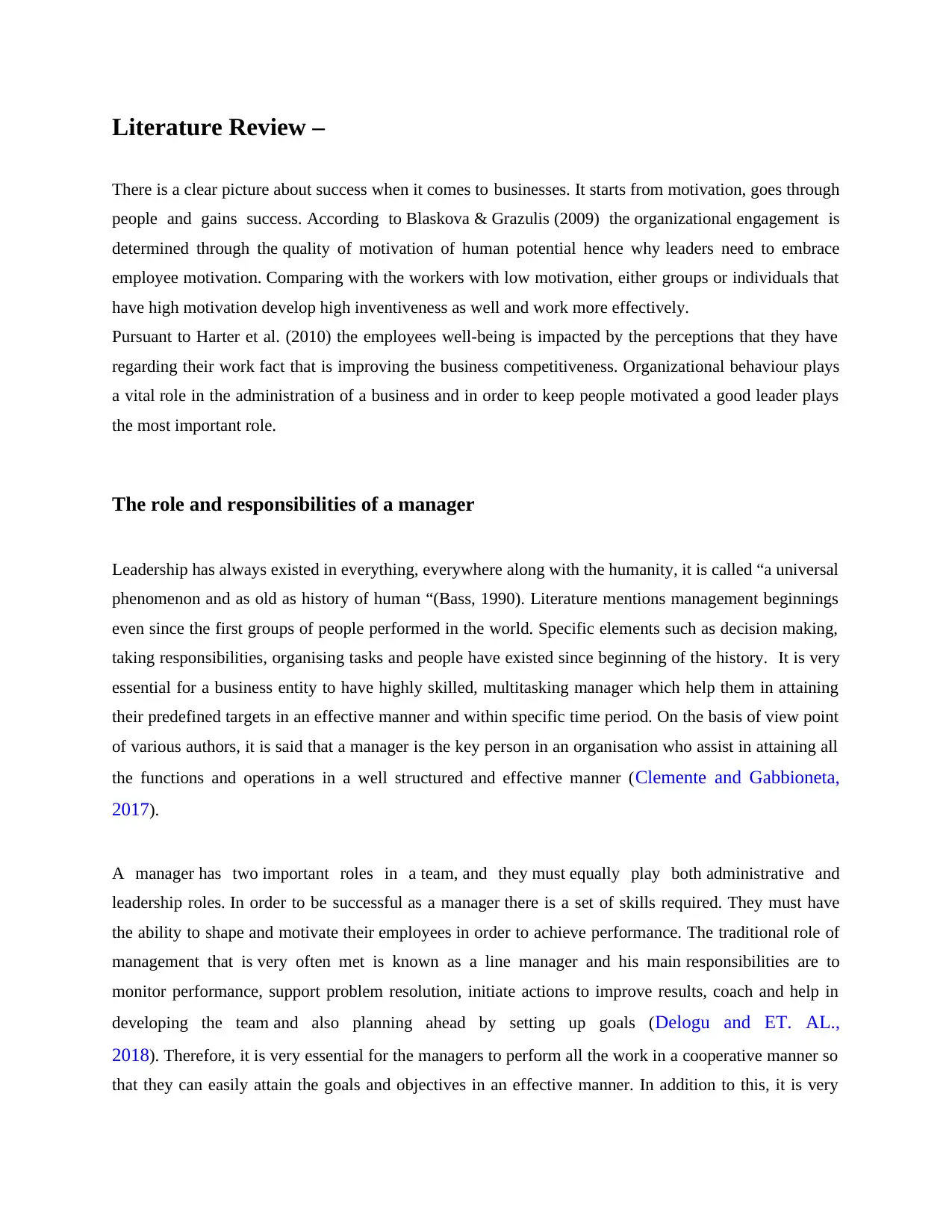
Literature Review –
There is a clear picture about success when it comes to businesses. It starts from motivation, goes through
people and gains success. According to Blaskova & Grazulis (2009) the organizational engagement is
determined through the quality of motivation of human potential hence why leaders need to embrace
employee motivation. Comparing with the workers with low motivation, either groups or individuals that
have high motivation develop high inventiveness as well and work more effectively.
Pursuant to Harter et al. (2010) the employees well-being is impacted by the perceptions that they have
regarding their work fact that is improving the business competitiveness. Organizational behaviour plays
a vital role in the administration of a business and in order to keep people motivated a good leader plays
the most important role.
The role and responsibilities of a manager
Leadership has always existed in everything, everywhere along with the humanity, it is called “a universal
phenomenon and as old as history of human “(Bass, 1990). Literature mentions management beginnings
even since the first groups of people performed in the world. Specific elements such as decision making,
taking responsibilities, organising tasks and people have existed since beginning of the history. It is very
essential for a business entity to have highly skilled, multitasking manager which help them in attaining
their predefined targets in an effective manner and within specific time period. On the basis of view point
of various authors, it is said that a manager is the key person in an organisation who assist in attaining all
the functions and operations in a well structured and effective manner (Clemente and Gabbioneta,
2017).
A manager has two important roles in a team, and they must equally play both administrative and
leadership roles. In order to be successful as a manager there is a set of skills required. They must have
the ability to shape and motivate their employees in order to achieve performance. The traditional role of
management that is very often met is known as a line manager and his main responsibilities are to
monitor performance, support problem resolution, initiate actions to improve results, coach and help in
developing the team and also planning ahead by setting up goals (Delogu and ET. AL.,
2018). Therefore, it is very essential for the managers to perform all the work in a cooperative manner so
that they can easily attain the goals and objectives in an effective manner. In addition to this, it is very
There is a clear picture about success when it comes to businesses. It starts from motivation, goes through
people and gains success. According to Blaskova & Grazulis (2009) the organizational engagement is
determined through the quality of motivation of human potential hence why leaders need to embrace
employee motivation. Comparing with the workers with low motivation, either groups or individuals that
have high motivation develop high inventiveness as well and work more effectively.
Pursuant to Harter et al. (2010) the employees well-being is impacted by the perceptions that they have
regarding their work fact that is improving the business competitiveness. Organizational behaviour plays
a vital role in the administration of a business and in order to keep people motivated a good leader plays
the most important role.
The role and responsibilities of a manager
Leadership has always existed in everything, everywhere along with the humanity, it is called “a universal
phenomenon and as old as history of human “(Bass, 1990). Literature mentions management beginnings
even since the first groups of people performed in the world. Specific elements such as decision making,
taking responsibilities, organising tasks and people have existed since beginning of the history. It is very
essential for a business entity to have highly skilled, multitasking manager which help them in attaining
their predefined targets in an effective manner and within specific time period. On the basis of view point
of various authors, it is said that a manager is the key person in an organisation who assist in attaining all
the functions and operations in a well structured and effective manner (Clemente and Gabbioneta,
2017).
A manager has two important roles in a team, and they must equally play both administrative and
leadership roles. In order to be successful as a manager there is a set of skills required. They must have
the ability to shape and motivate their employees in order to achieve performance. The traditional role of
management that is very often met is known as a line manager and his main responsibilities are to
monitor performance, support problem resolution, initiate actions to improve results, coach and help in
developing the team and also planning ahead by setting up goals (Delogu and ET. AL.,
2018). Therefore, it is very essential for the managers to perform all the work in a cooperative manner so
that they can easily attain the goals and objectives in an effective manner. In addition to this, it is very
⊘ This is a preview!⊘
Do you want full access?
Subscribe today to unlock all pages.

Trusted by 1+ million students worldwide
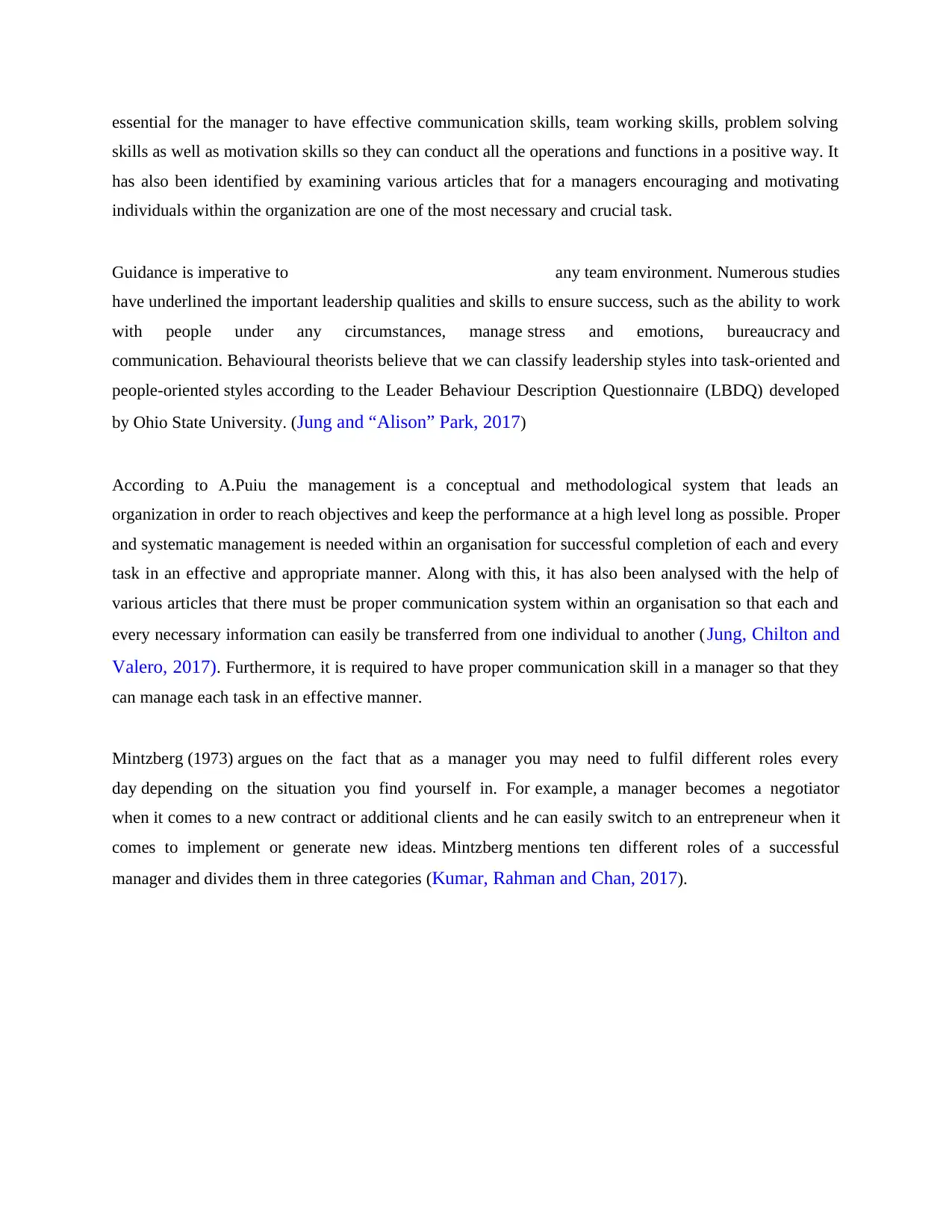
essential for the manager to have effective communication skills, team working skills, problem solving
skills as well as motivation skills so they can conduct all the operations and functions in a positive way. It
has also been identified by examining various articles that for a managers encouraging and motivating
individuals within the organization are one of the most necessary and crucial task.
Guidance is imperative to any team environment. Numerous studies
have underlined the important leadership qualities and skills to ensure success, such as the ability to work
with people under any circumstances, manage stress and emotions, bureaucracy and
communication. Behavioural theorists believe that we can classify leadership styles into task-oriented and
people-oriented styles according to the Leader Behaviour Description Questionnaire (LBDQ) developed
by Ohio State University. (Jung and “Alison” Park, 2017)
According to A.Puiu the management is a conceptual and methodological system that leads an
organization in order to reach objectives and keep the performance at a high level long as possible. Proper
and systematic management is needed within an organisation for successful completion of each and every
task in an effective and appropriate manner. Along with this, it has also been analysed with the help of
various articles that there must be proper communication system within an organisation so that each and
every necessary information can easily be transferred from one individual to another ( Jung, Chilton and
Valero, 2017). Furthermore, it is required to have proper communication skill in a manager so that they
can manage each task in an effective manner.
Mintzberg (1973) argues on the fact that as a manager you may need to fulfil different roles every
day depending on the situation you find yourself in. For example, a manager becomes a negotiator
when it comes to a new contract or additional clients and he can easily switch to an entrepreneur when it
comes to implement or generate new ideas. Mintzberg mentions ten different roles of a successful
manager and divides them in three categories (Kumar, Rahman and Chan, 2017).
skills as well as motivation skills so they can conduct all the operations and functions in a positive way. It
has also been identified by examining various articles that for a managers encouraging and motivating
individuals within the organization are one of the most necessary and crucial task.
Guidance is imperative to any team environment. Numerous studies
have underlined the important leadership qualities and skills to ensure success, such as the ability to work
with people under any circumstances, manage stress and emotions, bureaucracy and
communication. Behavioural theorists believe that we can classify leadership styles into task-oriented and
people-oriented styles according to the Leader Behaviour Description Questionnaire (LBDQ) developed
by Ohio State University. (Jung and “Alison” Park, 2017)
According to A.Puiu the management is a conceptual and methodological system that leads an
organization in order to reach objectives and keep the performance at a high level long as possible. Proper
and systematic management is needed within an organisation for successful completion of each and every
task in an effective and appropriate manner. Along with this, it has also been analysed with the help of
various articles that there must be proper communication system within an organisation so that each and
every necessary information can easily be transferred from one individual to another ( Jung, Chilton and
Valero, 2017). Furthermore, it is required to have proper communication skill in a manager so that they
can manage each task in an effective manner.
Mintzberg (1973) argues on the fact that as a manager you may need to fulfil different roles every
day depending on the situation you find yourself in. For example, a manager becomes a negotiator
when it comes to a new contract or additional clients and he can easily switch to an entrepreneur when it
comes to implement or generate new ideas. Mintzberg mentions ten different roles of a successful
manager and divides them in three categories (Kumar, Rahman and Chan, 2017).
Paraphrase This Document
Need a fresh take? Get an instant paraphrase of this document with our AI Paraphraser
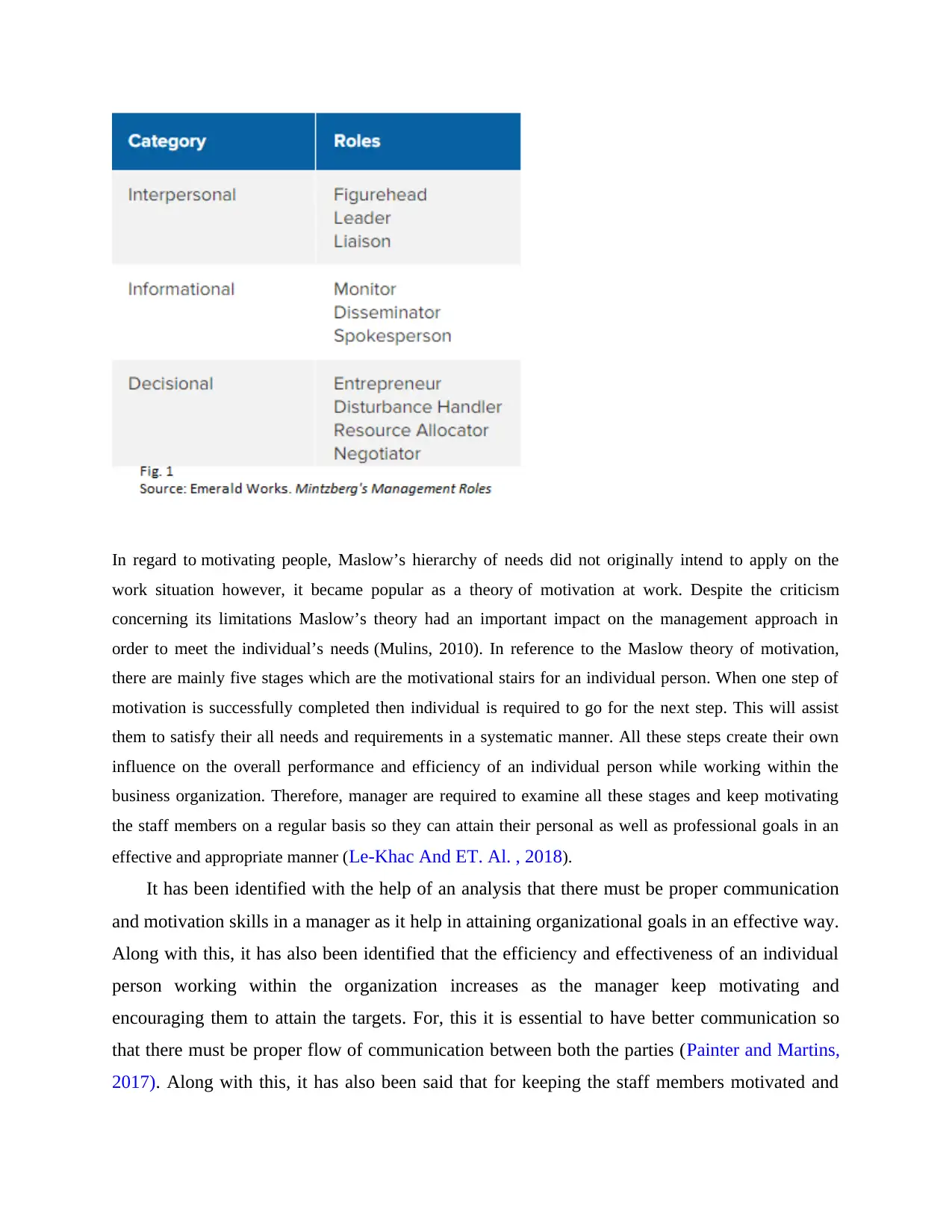
In regard to motivating people, Maslow’s hierarchy of needs did not originally intend to apply on the
work situation however, it became popular as a theory of motivation at work. Despite the criticism
concerning its limitations Maslow’s theory had an important impact on the management approach in
order to meet the individual’s needs (Mulins, 2010). In reference to the Maslow theory of motivation,
there are mainly five stages which are the motivational stairs for an individual person. When one step of
motivation is successfully completed then individual is required to go for the next step. This will assist
them to satisfy their all needs and requirements in a systematic manner. All these steps create their own
influence on the overall performance and efficiency of an individual person while working within the
business organization. Therefore, manager are required to examine all these stages and keep motivating
the staff members on a regular basis so they can attain their personal as well as professional goals in an
effective and appropriate manner (Le-Khac And ET. Al. , 2018).
It has been identified with the help of an analysis that there must be proper communication
and motivation skills in a manager as it help in attaining organizational goals in an effective way.
Along with this, it has also been identified that the efficiency and effectiveness of an individual
person working within the organization increases as the manager keep motivating and
encouraging them to attain the targets. For, this it is essential to have better communication so
that there must be proper flow of communication between both the parties (Painter and Martins,
2017). Along with this, it has also been said that for keeping the staff members motivated and
work situation however, it became popular as a theory of motivation at work. Despite the criticism
concerning its limitations Maslow’s theory had an important impact on the management approach in
order to meet the individual’s needs (Mulins, 2010). In reference to the Maslow theory of motivation,
there are mainly five stages which are the motivational stairs for an individual person. When one step of
motivation is successfully completed then individual is required to go for the next step. This will assist
them to satisfy their all needs and requirements in a systematic manner. All these steps create their own
influence on the overall performance and efficiency of an individual person while working within the
business organization. Therefore, manager are required to examine all these stages and keep motivating
the staff members on a regular basis so they can attain their personal as well as professional goals in an
effective and appropriate manner (Le-Khac And ET. Al. , 2018).
It has been identified with the help of an analysis that there must be proper communication
and motivation skills in a manager as it help in attaining organizational goals in an effective way.
Along with this, it has also been identified that the efficiency and effectiveness of an individual
person working within the organization increases as the manager keep motivating and
encouraging them to attain the targets. For, this it is essential to have better communication so
that there must be proper flow of communication between both the parties (Painter and Martins,
2017). Along with this, it has also been said that for keeping the staff members motivated and
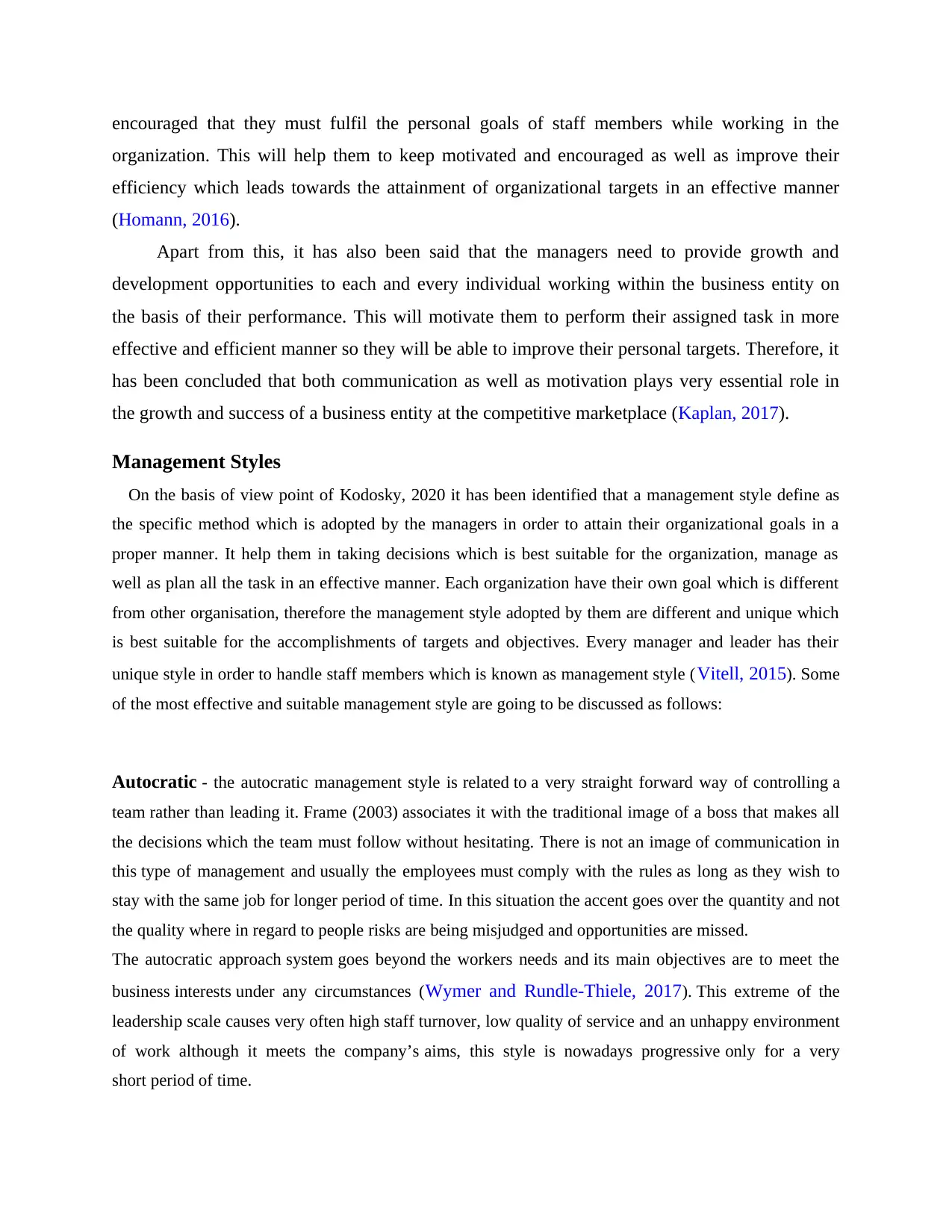
encouraged that they must fulfil the personal goals of staff members while working in the
organization. This will help them to keep motivated and encouraged as well as improve their
efficiency which leads towards the attainment of organizational targets in an effective manner
(Homann, 2016).
Apart from this, it has also been said that the managers need to provide growth and
development opportunities to each and every individual working within the business entity on
the basis of their performance. This will motivate them to perform their assigned task in more
effective and efficient manner so they will be able to improve their personal targets. Therefore, it
has been concluded that both communication as well as motivation plays very essential role in
the growth and success of a business entity at the competitive marketplace (Kaplan, 2017).
Management Styles
On the basis of view point of Kodosky, 2020 it has been identified that a management style define as
the specific method which is adopted by the managers in order to attain their organizational goals in a
proper manner. It help them in taking decisions which is best suitable for the organization, manage as
well as plan all the task in an effective manner. Each organization have their own goal which is different
from other organisation, therefore the management style adopted by them are different and unique which
is best suitable for the accomplishments of targets and objectives. Every manager and leader has their
unique style in order to handle staff members which is known as management style (Vitell, 2015). Some
of the most effective and suitable management style are going to be discussed as follows:
Autocratic - the autocratic management style is related to a very straight forward way of controlling a
team rather than leading it. Frame (2003) associates it with the traditional image of a boss that makes all
the decisions which the team must follow without hesitating. There is not an image of communication in
this type of management and usually the employees must comply with the rules as long as they wish to
stay with the same job for longer period of time. In this situation the accent goes over the quantity and not
the quality where in regard to people risks are being misjudged and opportunities are missed.
The autocratic approach system goes beyond the workers needs and its main objectives are to meet the
business interests under any circumstances (Wymer and Rundle-Thiele, 2017). This extreme of the
leadership scale causes very often high staff turnover, low quality of service and an unhappy environment
of work although it meets the company’s aims, this style is nowadays progressive only for a very
short period of time.
organization. This will help them to keep motivated and encouraged as well as improve their
efficiency which leads towards the attainment of organizational targets in an effective manner
(Homann, 2016).
Apart from this, it has also been said that the managers need to provide growth and
development opportunities to each and every individual working within the business entity on
the basis of their performance. This will motivate them to perform their assigned task in more
effective and efficient manner so they will be able to improve their personal targets. Therefore, it
has been concluded that both communication as well as motivation plays very essential role in
the growth and success of a business entity at the competitive marketplace (Kaplan, 2017).
Management Styles
On the basis of view point of Kodosky, 2020 it has been identified that a management style define as
the specific method which is adopted by the managers in order to attain their organizational goals in a
proper manner. It help them in taking decisions which is best suitable for the organization, manage as
well as plan all the task in an effective manner. Each organization have their own goal which is different
from other organisation, therefore the management style adopted by them are different and unique which
is best suitable for the accomplishments of targets and objectives. Every manager and leader has their
unique style in order to handle staff members which is known as management style (Vitell, 2015). Some
of the most effective and suitable management style are going to be discussed as follows:
Autocratic - the autocratic management style is related to a very straight forward way of controlling a
team rather than leading it. Frame (2003) associates it with the traditional image of a boss that makes all
the decisions which the team must follow without hesitating. There is not an image of communication in
this type of management and usually the employees must comply with the rules as long as they wish to
stay with the same job for longer period of time. In this situation the accent goes over the quantity and not
the quality where in regard to people risks are being misjudged and opportunities are missed.
The autocratic approach system goes beyond the workers needs and its main objectives are to meet the
business interests under any circumstances (Wymer and Rundle-Thiele, 2017). This extreme of the
leadership scale causes very often high staff turnover, low quality of service and an unhappy environment
of work although it meets the company’s aims, this style is nowadays progressive only for a very
short period of time.
⊘ This is a preview!⊘
Do you want full access?
Subscribe today to unlock all pages.

Trusted by 1+ million students worldwide
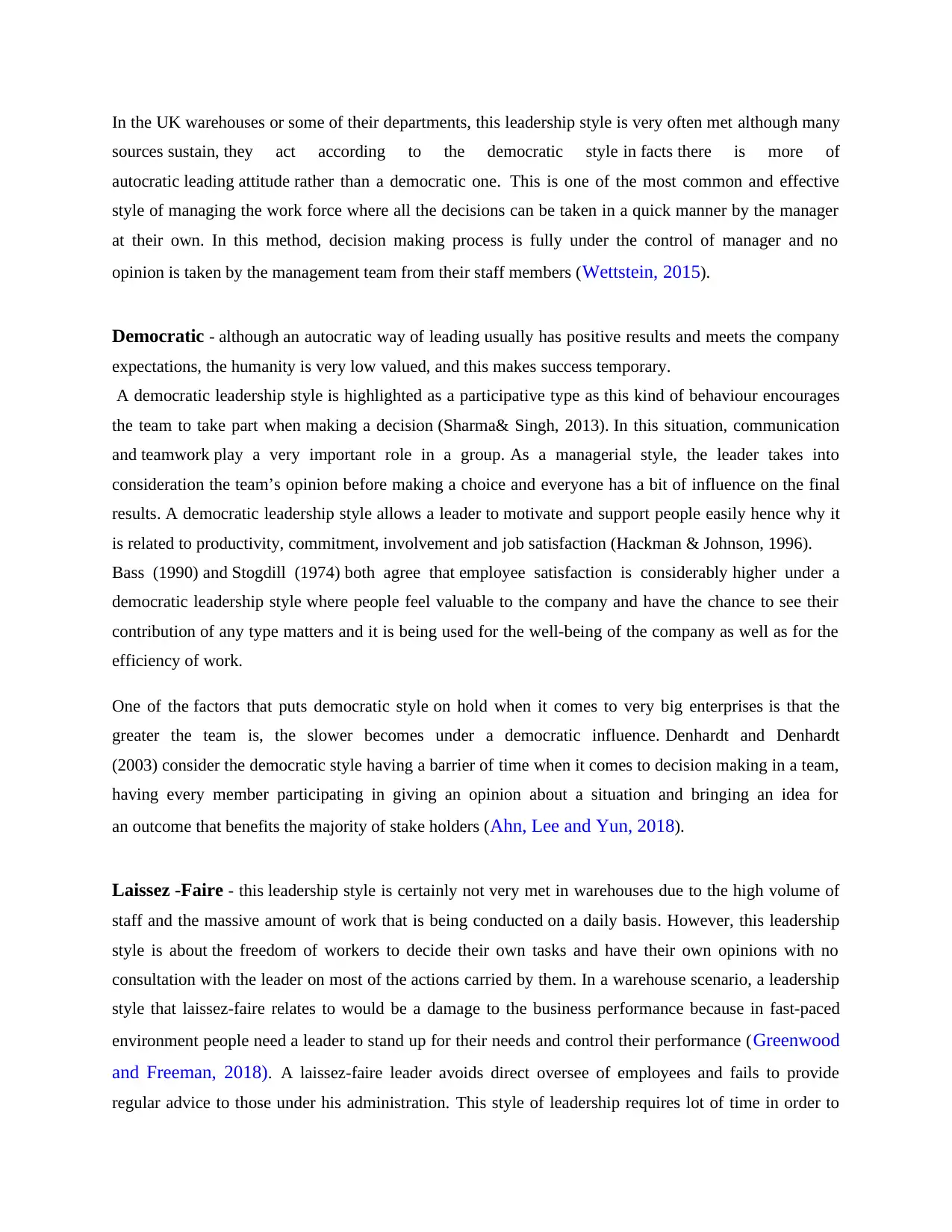
In the UK warehouses or some of their departments, this leadership style is very often met although many
sources sustain, they act according to the democratic style in facts there is more of
autocratic leading attitude rather than a democratic one. This is one of the most common and effective
style of managing the work force where all the decisions can be taken in a quick manner by the manager
at their own. In this method, decision making process is fully under the control of manager and no
opinion is taken by the management team from their staff members (Wettstein, 2015).
Democratic - although an autocratic way of leading usually has positive results and meets the company
expectations, the humanity is very low valued, and this makes success temporary.
A democratic leadership style is highlighted as a participative type as this kind of behaviour encourages
the team to take part when making a decision (Sharma& Singh, 2013). In this situation, communication
and teamwork play a very important role in a group. As a managerial style, the leader takes into
consideration the team’s opinion before making a choice and everyone has a bit of influence on the final
results. A democratic leadership style allows a leader to motivate and support people easily hence why it
is related to productivity, commitment, involvement and job satisfaction (Hackman & Johnson, 1996).
Bass (1990) and Stogdill (1974) both agree that employee satisfaction is considerably higher under a
democratic leadership style where people feel valuable to the company and have the chance to see their
contribution of any type matters and it is being used for the well-being of the company as well as for the
efficiency of work.
One of the factors that puts democratic style on hold when it comes to very big enterprises is that the
greater the team is, the slower becomes under a democratic influence. Denhardt and Denhardt
(2003) consider the democratic style having a barrier of time when it comes to decision making in a team,
having every member participating in giving an opinion about a situation and bringing an idea for
an outcome that benefits the majority of stake holders (Ahn, Lee and Yun, 2018).
Laissez -Faire - this leadership style is certainly not very met in warehouses due to the high volume of
staff and the massive amount of work that is being conducted on a daily basis. However, this leadership
style is about the freedom of workers to decide their own tasks and have their own opinions with no
consultation with the leader on most of the actions carried by them. In a warehouse scenario, a leadership
style that laissez-faire relates to would be a damage to the business performance because in fast-paced
environment people need a leader to stand up for their needs and control their performance (Greenwood
and Freeman, 2018). A laissez-faire leader avoids direct oversee of employees and fails to provide
regular advice to those under his administration. This style of leadership requires lot of time in order to
sources sustain, they act according to the democratic style in facts there is more of
autocratic leading attitude rather than a democratic one. This is one of the most common and effective
style of managing the work force where all the decisions can be taken in a quick manner by the manager
at their own. In this method, decision making process is fully under the control of manager and no
opinion is taken by the management team from their staff members (Wettstein, 2015).
Democratic - although an autocratic way of leading usually has positive results and meets the company
expectations, the humanity is very low valued, and this makes success temporary.
A democratic leadership style is highlighted as a participative type as this kind of behaviour encourages
the team to take part when making a decision (Sharma& Singh, 2013). In this situation, communication
and teamwork play a very important role in a group. As a managerial style, the leader takes into
consideration the team’s opinion before making a choice and everyone has a bit of influence on the final
results. A democratic leadership style allows a leader to motivate and support people easily hence why it
is related to productivity, commitment, involvement and job satisfaction (Hackman & Johnson, 1996).
Bass (1990) and Stogdill (1974) both agree that employee satisfaction is considerably higher under a
democratic leadership style where people feel valuable to the company and have the chance to see their
contribution of any type matters and it is being used for the well-being of the company as well as for the
efficiency of work.
One of the factors that puts democratic style on hold when it comes to very big enterprises is that the
greater the team is, the slower becomes under a democratic influence. Denhardt and Denhardt
(2003) consider the democratic style having a barrier of time when it comes to decision making in a team,
having every member participating in giving an opinion about a situation and bringing an idea for
an outcome that benefits the majority of stake holders (Ahn, Lee and Yun, 2018).
Laissez -Faire - this leadership style is certainly not very met in warehouses due to the high volume of
staff and the massive amount of work that is being conducted on a daily basis. However, this leadership
style is about the freedom of workers to decide their own tasks and have their own opinions with no
consultation with the leader on most of the actions carried by them. In a warehouse scenario, a leadership
style that laissez-faire relates to would be a damage to the business performance because in fast-paced
environment people need a leader to stand up for their needs and control their performance (Greenwood
and Freeman, 2018). A laissez-faire leader avoids direct oversee of employees and fails to provide
regular advice to those under his administration. This style of leadership requires lot of time in order to
Paraphrase This Document
Need a fresh take? Get an instant paraphrase of this document with our AI Paraphraser
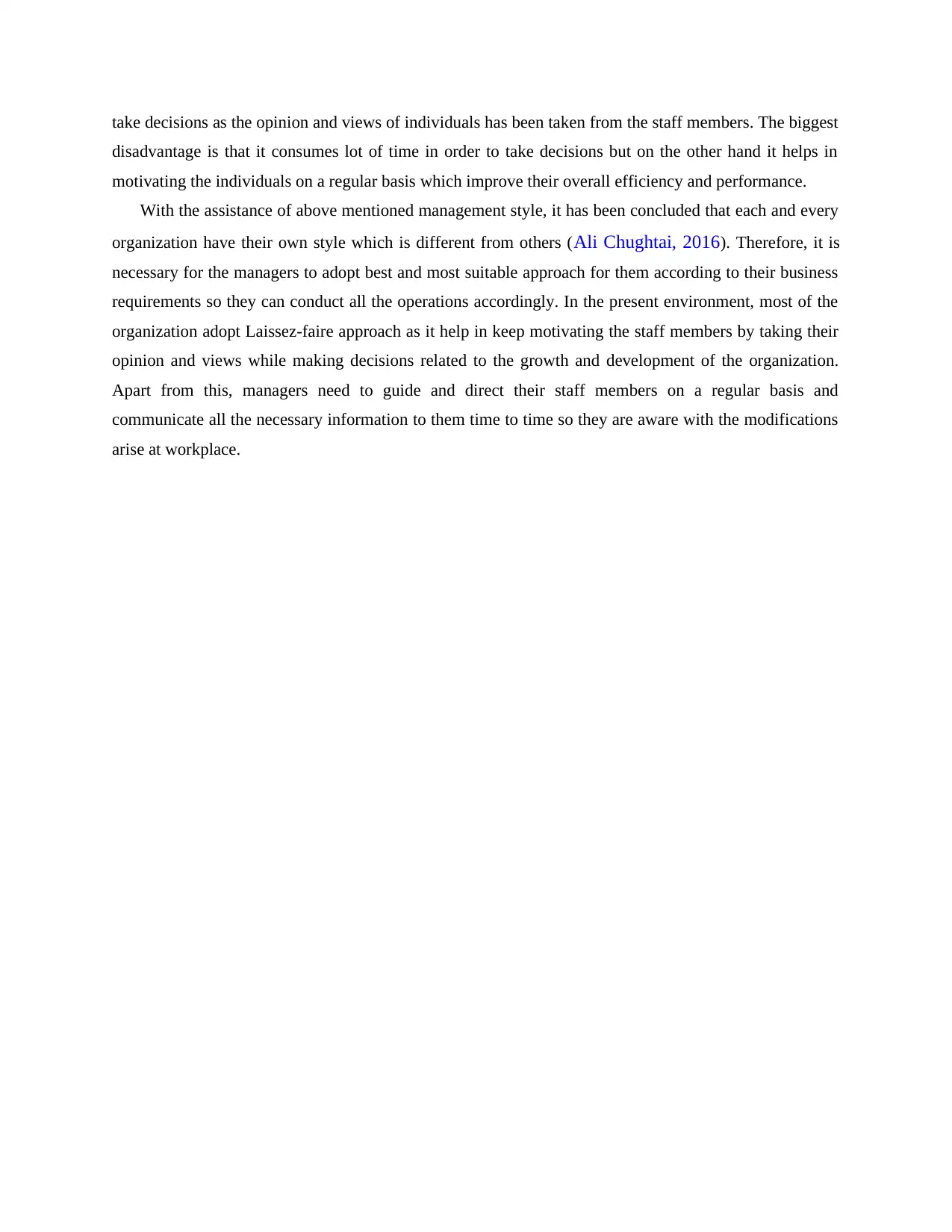
take decisions as the opinion and views of individuals has been taken from the staff members. The biggest
disadvantage is that it consumes lot of time in order to take decisions but on the other hand it helps in
motivating the individuals on a regular basis which improve their overall efficiency and performance.
With the assistance of above mentioned management style, it has been concluded that each and every
organization have their own style which is different from others (Ali Chughtai, 2016). Therefore, it is
necessary for the managers to adopt best and most suitable approach for them according to their business
requirements so they can conduct all the operations accordingly. In the present environment, most of the
organization adopt Laissez-faire approach as it help in keep motivating the staff members by taking their
opinion and views while making decisions related to the growth and development of the organization.
Apart from this, managers need to guide and direct their staff members on a regular basis and
communicate all the necessary information to them time to time so they are aware with the modifications
arise at workplace.
disadvantage is that it consumes lot of time in order to take decisions but on the other hand it helps in
motivating the individuals on a regular basis which improve their overall efficiency and performance.
With the assistance of above mentioned management style, it has been concluded that each and every
organization have their own style which is different from others (Ali Chughtai, 2016). Therefore, it is
necessary for the managers to adopt best and most suitable approach for them according to their business
requirements so they can conduct all the operations accordingly. In the present environment, most of the
organization adopt Laissez-faire approach as it help in keep motivating the staff members by taking their
opinion and views while making decisions related to the growth and development of the organization.
Apart from this, managers need to guide and direct their staff members on a regular basis and
communicate all the necessary information to them time to time so they are aware with the modifications
arise at workplace.
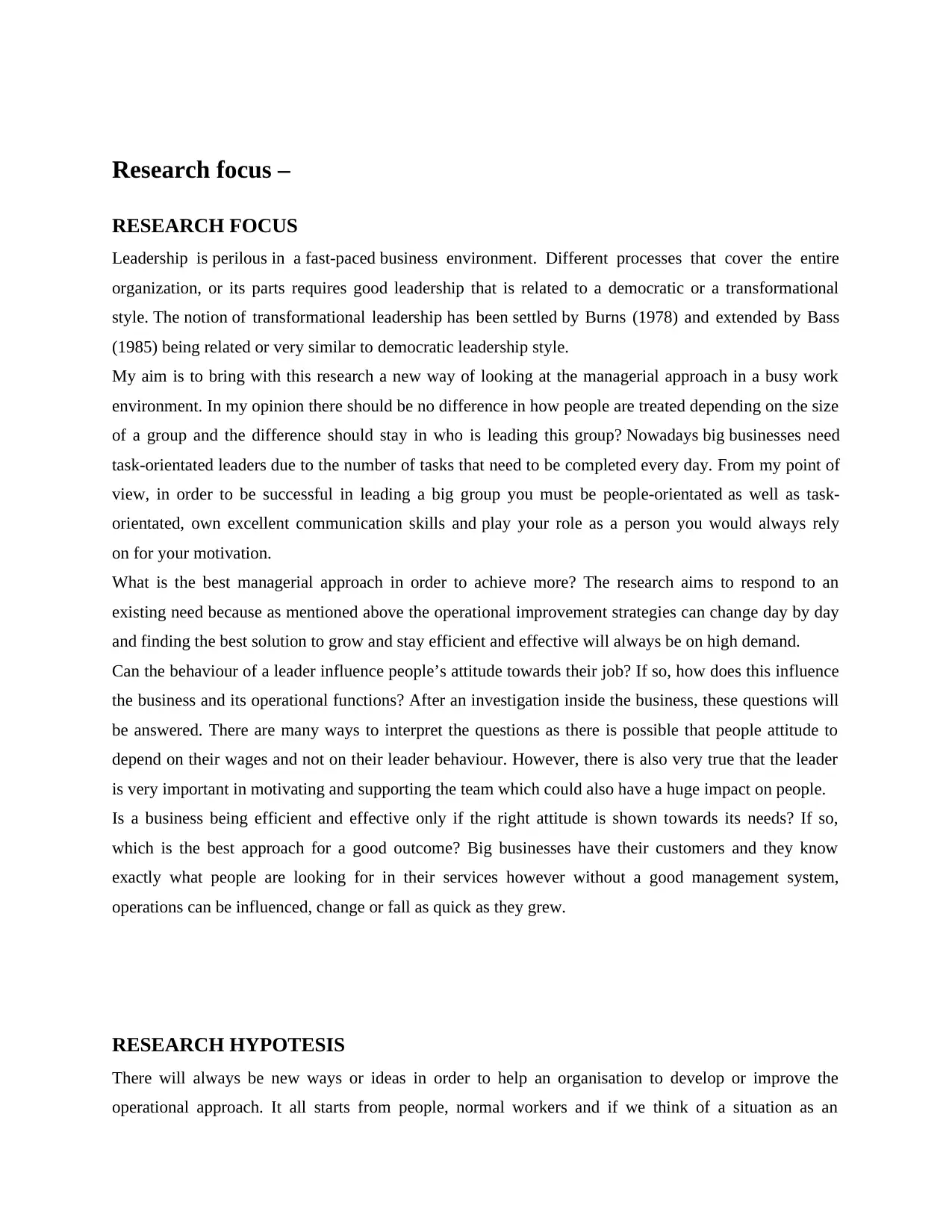
Research focus –
RESEARCH FOCUS
Leadership is perilous in a fast-paced business environment. Different processes that cover the entire
organization, or its parts requires good leadership that is related to a democratic or a transformational
style. The notion of transformational leadership has been settled by Burns (1978) and extended by Bass
(1985) being related or very similar to democratic leadership style.
My aim is to bring with this research a new way of looking at the managerial approach in a busy work
environment. In my opinion there should be no difference in how people are treated depending on the size
of a group and the difference should stay in who is leading this group? Nowadays big businesses need
task-orientated leaders due to the number of tasks that need to be completed every day. From my point of
view, in order to be successful in leading a big group you must be people-orientated as well as task-
orientated, own excellent communication skills and play your role as a person you would always rely
on for your motivation.
What is the best managerial approach in order to achieve more? The research aims to respond to an
existing need because as mentioned above the operational improvement strategies can change day by day
and finding the best solution to grow and stay efficient and effective will always be on high demand.
Can the behaviour of a leader influence people’s attitude towards their job? If so, how does this influence
the business and its operational functions? After an investigation inside the business, these questions will
be answered. There are many ways to interpret the questions as there is possible that people attitude to
depend on their wages and not on their leader behaviour. However, there is also very true that the leader
is very important in motivating and supporting the team which could also have a huge impact on people.
Is a business being efficient and effective only if the right attitude is shown towards its needs? If so,
which is the best approach for a good outcome? Big businesses have their customers and they know
exactly what people are looking for in their services however without a good management system,
operations can be influenced, change or fall as quick as they grew.
RESEARCH HYPOTESIS
There will always be new ways or ideas in order to help an organisation to develop or improve the
operational approach. It all starts from people, normal workers and if we think of a situation as an
RESEARCH FOCUS
Leadership is perilous in a fast-paced business environment. Different processes that cover the entire
organization, or its parts requires good leadership that is related to a democratic or a transformational
style. The notion of transformational leadership has been settled by Burns (1978) and extended by Bass
(1985) being related or very similar to democratic leadership style.
My aim is to bring with this research a new way of looking at the managerial approach in a busy work
environment. In my opinion there should be no difference in how people are treated depending on the size
of a group and the difference should stay in who is leading this group? Nowadays big businesses need
task-orientated leaders due to the number of tasks that need to be completed every day. From my point of
view, in order to be successful in leading a big group you must be people-orientated as well as task-
orientated, own excellent communication skills and play your role as a person you would always rely
on for your motivation.
What is the best managerial approach in order to achieve more? The research aims to respond to an
existing need because as mentioned above the operational improvement strategies can change day by day
and finding the best solution to grow and stay efficient and effective will always be on high demand.
Can the behaviour of a leader influence people’s attitude towards their job? If so, how does this influence
the business and its operational functions? After an investigation inside the business, these questions will
be answered. There are many ways to interpret the questions as there is possible that people attitude to
depend on their wages and not on their leader behaviour. However, there is also very true that the leader
is very important in motivating and supporting the team which could also have a huge impact on people.
Is a business being efficient and effective only if the right attitude is shown towards its needs? If so,
which is the best approach for a good outcome? Big businesses have their customers and they know
exactly what people are looking for in their services however without a good management system,
operations can be influenced, change or fall as quick as they grew.
RESEARCH HYPOTESIS
There will always be new ways or ideas in order to help an organisation to develop or improve the
operational approach. It all starts from people, normal workers and if we think of a situation as an
⊘ This is a preview!⊘
Do you want full access?
Subscribe today to unlock all pages.

Trusted by 1+ million students worldwide
1 out of 33
Related Documents
Your All-in-One AI-Powered Toolkit for Academic Success.
+13062052269
info@desklib.com
Available 24*7 on WhatsApp / Email
![[object Object]](/_next/static/media/star-bottom.7253800d.svg)
Unlock your academic potential
Copyright © 2020–2026 A2Z Services. All Rights Reserved. Developed and managed by ZUCOL.





